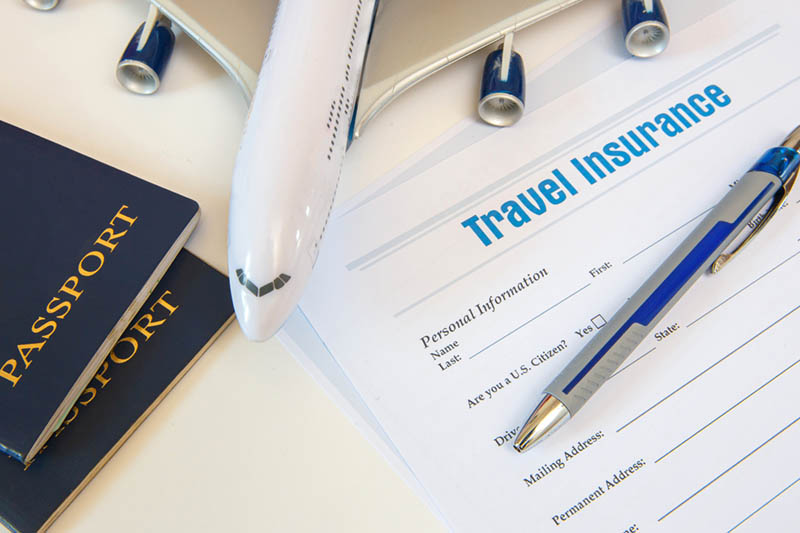Guide To Choosing The Best Travel Insurance Plan – that will be the topic of today’s article.
Before introducing this article, if you are interested in our core services which are expat financial, insurance and mortgages, you can contact me here.
The best time to consider your financial situation is when you are moving to a new country.
Introduction
International travel insurance is intended to provide a comprehensive level of coverage that ranges from unforeseen medical to travel-related issues incurred during the insured’s trip outside the country. It is a type of medical insurance that provides medical coverage for the insured when away from their home country.
Anything from a sprain to a blood test can run up to thousands of dollars when you do not have the proper medical coverage. Having this happen in a foreign country makes it worse and harder to mitigate. This is why securing international travel insurance is non-negotiable while you live in or travel to other countries.

Differences Between Health Insurance and Travel Insurance
Many prospective expatriates get very confused when confronted with these two choices. Although both options are designed to help the insured handle unforeseen challenges (especially medical) when they are out of their home country, each has particular purposes.
Without understanding the thin line that separates them, you may end up with the wrong international medical insurance and incur outrageous medical expenses abroad. The differences between global health and travel insurance are:
- International health insurance is designed to cover the insured’s medical expenses when they relocate from their home country to a foreign country. This relocation is expected to go on for an extended period of time. As for travel insurance, medical coverage is provided for unforeseen, emergency treatment required while the insured is in a new country for a short period.
- International health insurance explicitly covers medical and health needs, from emergency to routine check-ups. But travel insurance provides more than medical coverage. It covers travel-related issues like cancellations, lost/misplaced luggage or personal belongings, and other problems that could arise while you’re in transit.
- Travel insurance is great for holidaymakers, business persons who travel a lot for work, family trips, and other short-term traveling needs. International health insurance, on the other hand, is most suitable for expatriates that plan to either work or live in a foreign country for a prolonged period.
- Travel insurance does not cover chronic or terminal illnesses abroad. The insured would need to be transferred back to their home country or bear the costs without insurance. With international health insurance, you get regular check-ups, visits, maternity, newborn covers, and even cancer treatment.
- When it comes to health issues, travel insurance will ensure that you’re treated to the point where you become fit for travel. International health insurance offers the insured the flexibility to choose where they’d rather receive their treatment.
- Another point of difference is in the duration of both insurance policies. Travel insurance is valid for just six months. If you are gone for only a few days, you can insure just those days. If you travel frequently, you can get an annual plan to ensure you’re covered for the days you travel within the year.
- Health insurance can be stretched over the entire period you’ll be away from your home country. You can extend it to cover monthly, quarterly, semi-annual, or even annual periods at a time.
- With travel insurance, you have control over which geographical locations you want to receive coverage. International health insurance, on the other hand, does just what its name implies. It doesn’t matter which part of the world you enter. As long as you’re there and you have medical needs, you’ll get it.
- The cost of your travel insurance is determined by 1) your age, 2) the duration of the trip, and 3) the amount of coverage you want. The cost of your international health insurance is determined by the number of medical procedures you wish to have covered.
While regular checkups, emergency treatments, in-patient, and out-patient treatments, and other simple procedures will come with a ‘basic’ plan, adding other procedures for cancer, maternity, vision, dental, newborn, etc., will drive up the cost.

What Does International Travel Insurance Cover?
Like we mentioned earlier, travel insurance provides coverage for a broad range of travel-related issues that could disturb or disrupt your trip. What your travel insurance covers depends largely on what plan you are on (basic, complimentary, or exclusive) and what you specifically ask for, but these are some of the regular provisions;

1. Cancellation or Interruption
Should your trip be canceled for unexpected reasons, your insurance ensures that a significant part of your non-refundable expenses is returned to you. If your flight has been delayed, your travel insurance will cover whatever fee you incur while waiting for the next flight. This might be in food or accommodation costs. This coverage only accounts for a few hours of delay.
2. Emergency Evacuation
If, during your trip or the vacation, you fall seriously ill or get into a severe accident, your travel insurance will not cover the extra medical costs. Instead, travel insurance will pay the fees for transporting you back to your home country so that you may receive the necessary medical attention.
3. Loss of Luggage or Personal Belongings
When you lose your luggage, passport, wallet, or personal belongings (through no fault on your end), the travel insurance reimburses you with a significant part of the lost items’ worth.
4. Repatriation Benefits
In the unfortunate case that the insured dies on the trip, travel insurance covers the cost of preparing the body and transporting the body back to their home country.
5. Personal Liability
If you, the insured, cause damage to a third party, your travel insurance can cover the cost of compensation. This damage might be either to the third party’s property or to their person. Regardless, they are compensated.
6. Emergency Medical Treatment
During your trip or for the duration of your short stay in a foreign country, you might fall sick or get into a few minor accidents. Travel insurance will cover the medical bills for those issues. If medical treatment is needed for a pre-existing condition, your travel insurance may not hide it.
There are a few exclusions that are common to travel insurance policies, and some of them include:
1. An Unapproved/Pre-Existing Medical Condition
The medical coverage provided in travel insurance is not thorough and would therefore not cover pre-existing medical conditions or unapproved ones when the need arises. Also, if you have been medically advised against traveling and a need occurs during your trip, your claim will not be granted.
2. High-Risk Activities
Any loss incurred from participating in activities the policy rules out as dangerous and high-risk will not be covered. This includes illnesses, injuries, and loss of property.
3. Ignoring Directives
If you choose to travel against specific ‘Do Not Travel’ directives, your travel insurance will not cover you. Also, ignoring state rules and incurring certain losses, as a result, will not be considered.
4. Carelessness and Recklessness
Losses caused by intentional carelessness and recklessness will not be covered in the insurance, and the claims will not be granted.
Why International Travel Insurance is Essential

Despite the obvious benefits buying travel insurance offers, many prospective travelers still find it difficult to understand why it is essential. Here are a few reasons why travel insurance is essential for expats;
1. Hard to Ruin Your Trip
Many small and big things could ruin your trip and make you lose money. Flight problems are more common than a lot of us would prefer. Many of them are either delayed for long hours or canceled altogether. One canceled flight could have ripple effects that could affect your hotel and dinner reservations, your bank account, and ultimately your mood.
With travel insurance, cancellations or other annoying interruptions are no longer so bad. This is because you’re reimbursed with the non-refundable expenses that have accrued due to the bump. Also, if you have to cancel your trip for a good, covered reason, you do not have to lose money.
Your vacation investment will be saved and ready for you to claim at a more appropriate time. Without that insurance, you would have lost it all.
2. Your Losses Will Not Hurt as Much
No matter how careful you are, your personal belongings and luggage may get lost through no fault of yours. They could also be stolen or damaged. When things like this happen, you’ll not need to worry so much because you can claim the cost of your losses from your insurance provider.
3. Foreign Medical Expenses are Very Expensive
Simply traveling to a new place and eating ethnic cuisine can affect the human system negatively. You cannot completely rule out the possibility of falling sick or getting involved in an accident, no matter how small. Many of these countries will not recognize the insurance plan you had in your home country and, as a result, drive your bill to soar heights.
Without an insurance plan, many of them will only accept cash upfront. By buying a travel insurance plan, you rule out the possibility of you being stranded and cash-strapped in the middle of an emergency.
4. Finding Affordable Travel Insurance is Easy
Many people rule out travel insurance because of its cost, and that’s quite understandable. However, travel insurance can be very affordable when you go over your options with your provider and map out your coverage limits.
5. It Helps With Your Peace of Mind
There’s no better feeling than knowing somebody has your back, even though that somebody is your insurance provider. Still, traveling with your travel insurance intact helps you worry less about confronting unexpected challenges during your trip.
International Travel Insurance for Expats
The ‘types’ of travel insurance for expats are categorized based on different factors. For example, classification based on the duration of your trip includes;

One-Way Travel Insurance
A traveler may find this particularly useful if they are traveling without a return ticket or a return date in mind. This usually happens with those that have chosen to stay in the new area for a long time. This type will only cover the insured during the journey from their home country to the destination, after which they would be given little time to find a suitable alternative.
Single Trip Travel Insurance
The single trip travel insurance is designed for travelers who want to embark on a one-off holiday. They would simply go on to their destination and return at a specific time. This insurance will cover the insured for various eventualities, as detailed in the insurance plan.
Annual Travel Insurance
If you travel frequently, single trip insurance might not be the best idea. Instead of buying international travel insurance every time, settle for multi-trip travel insurance that allows you to specify the number of days you would need to travel within a year. It is not just cost-effective; it also saves time and energy. The annual travel insurance will have a standard set of inclusions and exclusions—only the duration changes.
Mode of Classifying Travel Insurance
Trip Cancellation
The time between when you book your trip and when you eventually leave is enough room for the unexpected to happen. These unexpected happenings could affect your travel plans and make you have to cancel.
Now, a trip cancellation insurance will ensure that the non-refundable expenses you made while planning the trip are partly reimbursed. This way, your vacation investment is protected even though the plans have changed.
Trip Interruption
Trip interruption insurance is also similar to trip cancellation insurance. But with trip interruptions, it is assumed that you were ready to board your flight until something happened. In this case, non-refundable deposits are also returned to the insured.
Medical Insurance
This type of travel insurance provides the necessary medical coverage while you are outside your home country’s shores. The medical procedures covered depend on the offerings of your insurance provider, but it is mostly basic.
Baggage Insurance
Should anything happen to your luggage while you’re in transit, baggage insurance will ensure that every reasonable expense is covered.
All-Inclusive Insurance
This is the most expensive travel option because it includes all of the options listed above and some more. There are very few situations all-inclusive insurance would not cover.
How to Choose the Best Travel Insurance Plan

While shopping for your travel insurance, there are a few factors you must consider if you’re going to make the best decision.
1. Evaluate Your Trip
You want to start by calculating the costs of your trip and other travel expenses. Then, identify the coverages that are peculiar to you and your journey. This will help you prioritize your needs and narrow down your choices.
After identifying the coverages, decide if they are things you can handle without insurance. Although it is not advised that you leave your plans to chance, it is still your choice at the end of the day.
2. Research
There are many travel insurance options available, and it would be unwise to go with the first one you see without conducting thorough research. Do not wait until it’s a week to your departure date to buy travel insurance. No. Carefully go over different products and their coverages.
Put products from competitors side by side and which benefits are more attractive. Many of these providers offer quotes online. Find those that do and ask for a quote so you’ll have an idea of what you’re working with.
You can also use comparison tools to filter the available options by the coverage and other criteria. You could get an agent if this seems like too much work for you but remember that some of these agents help the providers push their products for a commission. Therefore, it’ll be unwise to rely on them entirely.
3. Consider the Coverage, Not the Price
The insurance cost might be an issue, but don’t allow it to distract you from what is truly important. If the insurance you buy does not cover the main/relevant scenarios, you want it to cover, what then is the point? While shopping, be very particular about which things are covered and which items are not.
For example, your travel insurance should always cover medical emergencies. If you’re carrying valuables, ensure your luggage is covered. Every insurance plan has a detailed list of inclusions and exclusions they permit. Therefore, ensure you read the list carefully before making your final decision.
4. Consider How Frequent You’ll Be Travelling
Different travel insurance providers consider how often you’ll be traveling. This detail could affect the cost and coverage of the plan. For an expat who travels frequently, a single trip policy might not suffice. An annual approach will be cost-effective in that case.
How Much Does it Cost?
There is no way to accurately depict how much travel insurance costs, especially when there are many factors that determine its price. Some of those factors will be highlighted below;
1. Age
Insurance providers have different price ranges for other age groups. The older the person is, the higher the cost of coverage. Some providers allow you to include your minors in the plan with zero or little cost to you. Some companies only cover individuals no older than 75-85 years.
2. Range of Coverage
While some providers provide coverage for only one particular region, others offer worldwide coverage. The more comprehensive the range of geographical coverage, the higher the cost.
3. Amount of Coverage
The more coverage you want, the more willing you should be to pay for it. Basic plans will typically provide you with basic coverage, but higher plans offer a wide range that comes at a higher cost.
4. The Cost of the Trip
A holiday trip pegged to cost at least $10,000 will, of course, need to be insured with a higher price than a $3,000 work trip requires.
5. The People You’re Travelling With
It’s quite easy to understand. The more people you travel with, the greater the costs of the risk.
6. How Often You Intend to Travel and For How Long
How long you intend to stay in a foreign area also affects the cost. This is because the risk continues to increase as the days go by. The insured’s continuous exposure to a foreign climate sets them up for higher medical risks that become increasingly expensive.
Overall, expect to use 4%-10% of your non-refundable, prepaid trip costs to purchase travel insurance.
How Soon Should You Get Insured as an Expat?

Regular travel psychology might have you believing that you need to buy your travel insurance a long time before your departure date, but that’s not what is advised. In fact, it is recommended that you buy your insurance as close to your departure date as possible. Some even advise that you do it the same day you are scheduled to travel!
Doing it this way will ensure that you’ll remain covered even if your flight is canceled or delayed by unexpected challenges. The fault with this logic is that you will be burdened with the process on departure day. In fact, many people decide to forgo the entire process completely once they near that date.
It would help if you also considered that buying early from some providers (at least 15 days from your departure date) may qualify you for a few bonus coverages. Others also advise that you start the hunt for a suitable travel insurance package when you make the first deposit for your trip.
The bottom line is that it does not matter so much when you decide to buy your travel insurance. The charges are not raised or reduced based on that factor, like flight tickets or hotel reservations. As long as you subscribe before your eventual departure, you’re on the right track.
Conclusion
The best international travel insurance may look a bit different for everyone due to individual preferences. Still, so long as you have the extra support and legal backup while you travel the world, traveling becomes a lot less worrisome and more fun.


